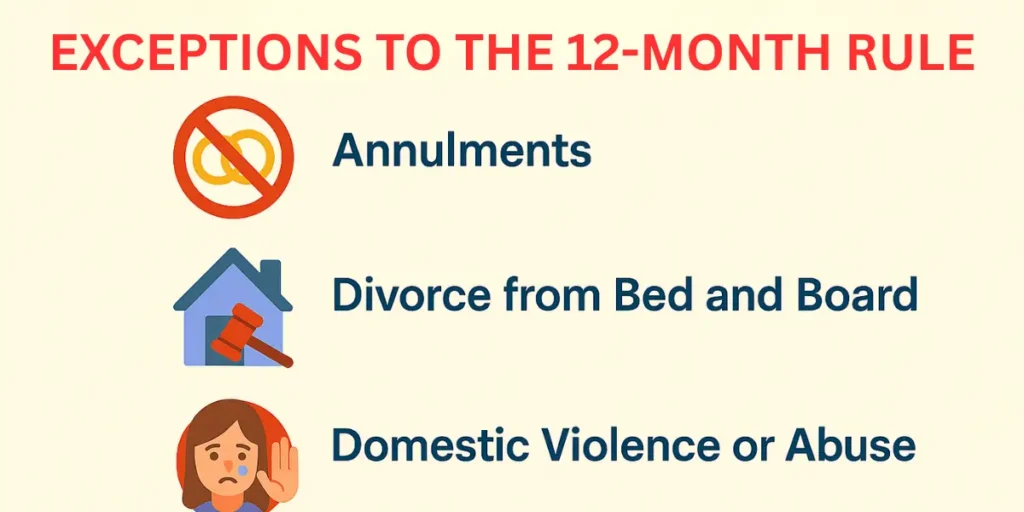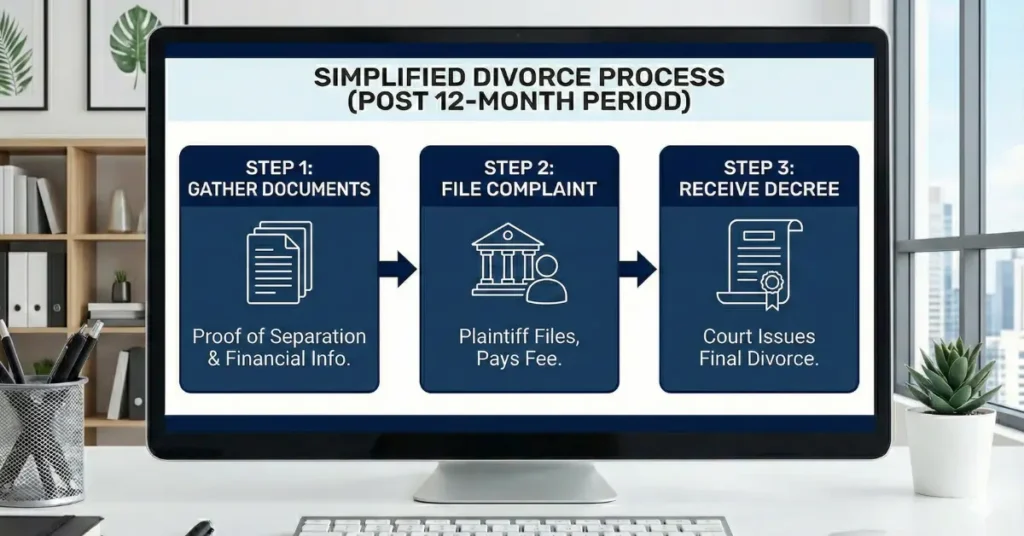In North Carolina, the divorce process is structured by specific legal requirements to ensure fairness and stability for both parties involved.
One key feature is the mandatory 12-month separation period, a rule established under North Carolina General Statute § 50-6, which stipulates that couples must live apart for one year before a divorce can be finalized.
This framework highlights the importance of allowing time for reflection and potential reconciliation, ensuring the decision to divorce is carefully considered. Understanding this requirement is vital for navigating the legal process efficiently and avoiding unnecessary complications.
Legal Framework for Divorce in North Carolina
North Carolina operates under a no-fault divorce system, meaning that neither party needs to prove wrongdoing, such as adultery or abuse, to obtain a divorce. Instead, the law focuses on the requirement of living separately for 12 months, as outlined in N.C. Gen. Stat. § 50-6.
This aligns with the legal reasons for divorce in North Carolina, emphasizing the importance of meeting the separation requirement.
During this period, spouses must reside in separate households and demonstrate an intent to remain apart. Cohabitation or attempts at reconciliation during this time can reset the separation period, delaying the process further.
Separation, as defined legally, goes beyond physical distance. It requires evidence, such as separation agreements or legal filings, to prove the intent and reality of living apart. These documents serve as critical proof in court and help streamline the divorce process once the waiting period is complete.
Purpose of the 12-Month Waiting Period
The 12-month waiting period acts as a cooling-off period, designed to encourage couples to reconsider their decision to divorce and explore reconciliation options. By slowing down the process, the law seeks to reduce impulsive decisions that might arise from temporary emotions or conflicts.
This period also protects the rights of both parties. It provides time to address key issues such as property division, child custody, and spousal support through mediation or legal settlement.
Additionally, courts require proof of separation, which could include documented evidence like utility bills, separate leases, or notarized agreements, ensuring both parties adhere to the legal framework.

Exceptions to the 12-Month Rule
While the one-year separation is mandatory for most divorces, there are exceptions:
- Annulments
In cases where the marriage is deemed invalid, such as fraud or bigamy, an annulment can bypass the waiting period.
- Divorce from Bed and Board
Under N.C. Gen. Stat. § 50-7, this legal action allows for a court-ordered separation in cases of severe marital misconduct, such as abandonment or abuse. Though not a full divorce, it can provide legal relief and protections during separation.
- Domestic Violence or Abuse
Victims of domestic violence may obtain protective orders and expedited legal remedies, ensuring their safety without adhering to the typical waiting period. These cases often involve temporary court orders addressing custody, support, and residence.

Common Misconceptions About the Waiting Period
Many people believe that the 12-month rule can be waived through mutual agreement or special circumstances. However, this is a myth. North Carolina law mandates the separation period for all standard divorces, regardless of consent between spouses.
Another misconception is the idea of “quick divorces”, which is not permissible unless one qualifies for an annulment or specific exceptions like Divorce from Bed and Board.
While legal agreements, such as separation agreements, can address property and custody matters during the waiting period, they do not circumvent the one-year requirement. Instead, these agreements help prepare for a smoother transition to finalizing the divorce.
The 12-month separation period in North Carolina serves a dual purpose: fostering reconciliation and ensuring that divorces are approached thoughtfully and fairly.
By understanding the legal framework, the purposes behind the waiting period, and the limited exceptions to the rule, individuals can navigate this challenging process with clarity and confidence.
Hiring a knowledgeable family law attorney is critical for managing the nuances of separation, ensuring legal compliance, and protecting one’s rights throughout the journey.
Implications of the 12-Month Requirement
The 12-month waiting period for a divorce in North Carolina is mandated by N.C. Gen. Stat. § 50-6, which requires couples to live separately and apart for one year before filing for divorce. This time frame has significant implications for financial arrangements, custody decisions, and overall marital resolution.
Financially, the separation period allows spouses to address spousal support, child support, and the equitable distribution of assets.
For instance, during this time, spouses can negotiate terms related to alimony or determine how marital property will be divided based on North Carolina’s laws. Failing to agree during this period can result in prolonged disputes after filing for divorce.
Child custody arrangements are also influenced by this waiting period. Courts prioritize the welfare of the child, and temporary custody arrangements often become the framework for long-term custody orders. Therefore, the actions and decisions made during this time are critical to future custody rulings.
Legal documentation during the waiting period is crucial. Couples must maintain proof of separation, such as distinct addresses, bills, or leases. Proper documentation minimizes disputes when the divorce process begins.
It also ensures that the court recognizes the separation period, which is mandatory for proceeding with a divorce in North Carolina.
Steps to Prepare During the Waiting Period
While waiting to meet the 12-month requirement, spouses can take proactive steps to ensure a smooth transition to divorce proceedings. The creation and execution of a separation agreement is among the most crucial duties.
This legally binding document outlines terms related to finances, property division, and child custody. With the help of a family law attorney, this agreement can establish a foundation for an uncontested divorce.
Couples must also document their intent to remain separated. This includes avoiding cohabitation and maintaining separate households. Any cohabitation during the waiting period resets the clock, extending the time before filing for divorce.
Seeking legal counsel early in the separation period is essential. Attorneys can provide advice on gathering evidence of separation, creating parenting plans, and preparing financial disclosures.
Additionally, they can help spouses understand the nuances of North Carolina’s divorce laws, ensuring compliance with all requirements.
During this time, spouses should also address their financial responsibilities. Paying off shared debts, separating bank accounts, and organizing financial records are crucial steps to avoid complications once the divorce process begins.

Filing for Divorce After the 12-Month Period
Once the 12-month waiting period has been completed, filing for divorce under N.C. Gen. Stat. § 50-6 involves several steps. The first step is to gather all necessary documentation, including proof of separation, signed affidavits, and financial disclosures.
Proof of separation may consist of signed statements, lease agreements, or other official documents demonstrating distinct living arrangements for 12 consecutive months.
The spouse initiating the divorce, referred to as the plaintiff, files a divorce complaint with the local court. This requires a filing fee, typically around $225, which may vary depending on the jurisdiction. The defendant, or other spouse, has 30 days from the day the complaint is filed to reply.
Once the court receives the response, a timeline for proceedings is established. Depending on the complexity of the case, this may involve mediation, temporary orders for spousal or child support, and eventually, a court hearing.
The process is speedier and less expensive if the couple files for an uncontested divorce. Controversial divorces may require further court hearings to resolve disputes.
The final step is a court-issued divorce decree. This formally dissolves the marriage and specifies the details of the divorce, such as property split, financial commitments, and custody agreements. Spouses must comply with these terms to avoid legal penalties.
Additional Legal Details to Consider
While the 12-month separation period is a central requirement, it’s also useful to know that North Carolina courts often require clear documentation of living separately.
This might include signed affidavits, separate lease agreements, or utility bills in each spouse’s name. By including these details, you help ensure that the separation period is legally recognized and that there are no delays in finalizing the divorce once the waiting period ends.
Conclusion
The 12-month waiting period in North Carolina serves a dual purpose: adhering to legal requirements and providing time for couples to address critical aspects of their divorce.
While the process may seem lengthy, it ensures that all decisions are made thoughtfully and in compliance with North Carolina family law.
From drafting a separation agreement to preparing for filing, the actions taken during this period have a lasting impact on the outcome of the divorce.
It is crucial to consult with a qualified family law attorney to navigate the process efficiently. Legal counsel can provide the expertise needed to handle complex cases, address disputes, and ensure all requirements are met.
The separation period is not just a waiting game; it is an opportunity to build a foundation for a fair and amicable divorce outcome. By understanding and respecting the legal framework, individuals can transition from separation to divorce with clarity and confidence.




